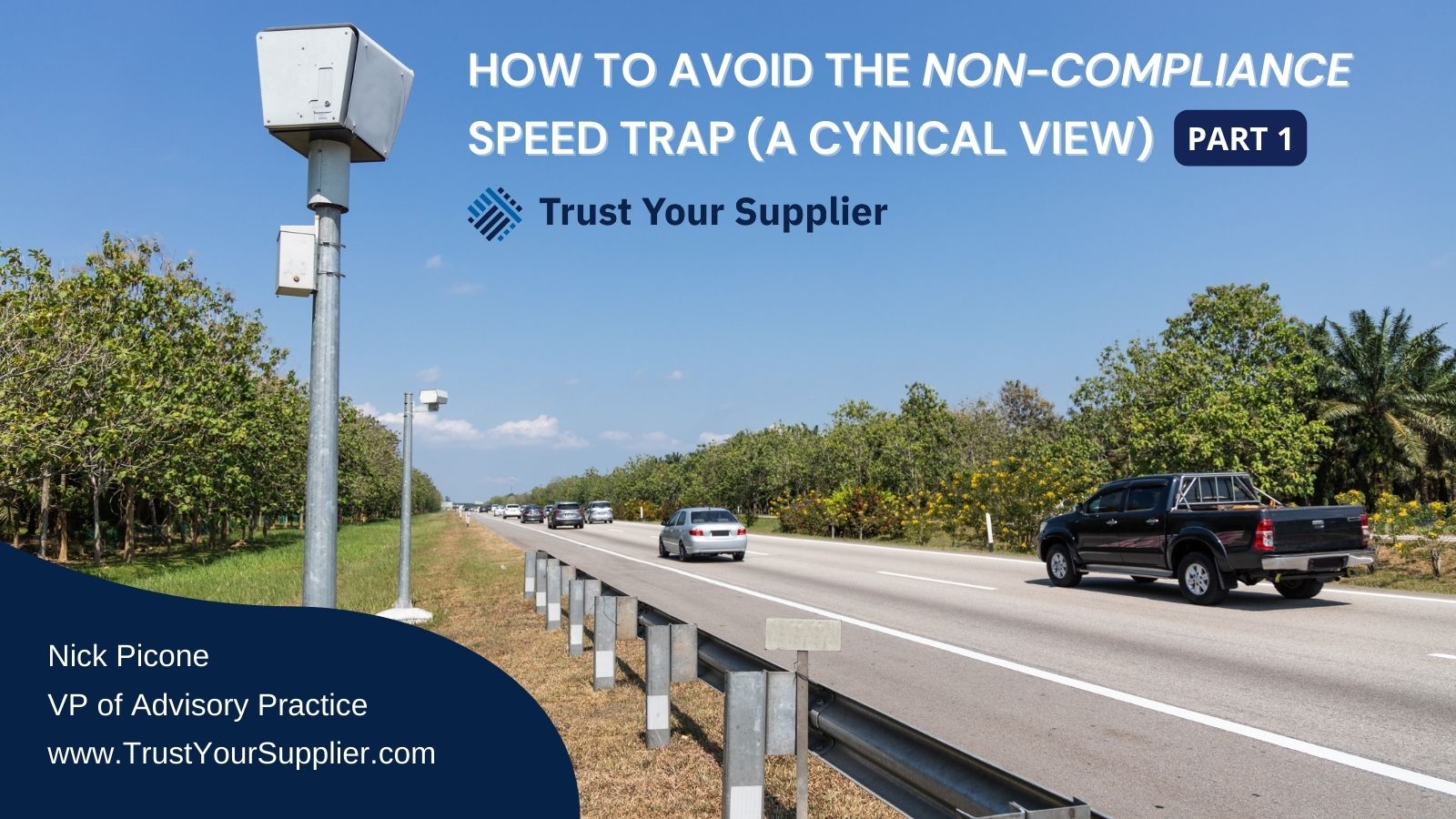by Nick Picone, Trust Your Supplier VP of Advisory Practice
“Regulatory fines and penalties for non-compliance are steep. In 2018, non-compliant firms were subject to $3.945 billion in penalties and another $794 million in judgments related to SEC investigations and complaints, while FINRA imposed $61 million in fines.” – What’s the True Overall Cost of Non-Compliance?, complysci (2019)
As illustrated by the above excerpt from a 2019 article, compliance challenges were an issue even before the pandemic hit. But when you learn that there were $3.945 billion in penalties – which is a significant number, in my opinion, what does it really represent? Is it a call to action or such an incomprehensibly large figure that makes you think, “wow,” and move on to pressing “right in front of you” demands?
Let’s face it, with the pandemic, war in Ukraine, persistent inflation, and a myriad of other “challenges” that we are facing, if it doesn’t affect you directly, $3.945 billion is someone else’s problem.
Even when you break down the numbers and demonstrate how non-compliance costs firms “nearly three times the cost of being compliant,” it does little to create a sense of urgency beyond passing awareness. By the way, the actual dollar figure for non-compliance in fiscal 2017 was $14.82 million. Conversely, the estimated cost to ensure your organization was compliant with existing regulations at that time was $5.47 million.
The Lens of Inertia
Like high blood pressure, inflation, and the fact that Netflix seems to cancel great series for no apparent reason, we all know compliance is “important,” but we can’t do anything about it, can we? There are so many other, more granular things to worry about from a collective and personal standpoint.
For example, at one of the many conferences I have attended over the past two months, it was alarming to see firsthand how many people had name badges that said “former” or “looking for work.
“My point in all this is that we have to, first of all, recognize the realities of the general mindset in our industry. How can you expect a procurement team to worry about carbon footprint and conflict minerals when there is so much economic uncertainty? Even in good times, there is a long history of “risk recognition and inaction.” A McKinsey 2006 survey provides compelling evidence of how risk avoidance was more a state of mind than an actual event.
While not as acute, the challenges we faced in 2006 are no different from those we face today regarding compliance. The question is this: why will our response be different this time?
One reason I think it will be different this time is that the cost of non-compliance increased by 2,650% from 2017-2019, which is the definition of exponential growth.
Ideal Conditions For A Speed Trap
“A hidden scaffolding of financial incentives underpins the policing of motorists in the United States, encouraging some communities to essentially repurpose armed officers as revenue agents searching for infractions largely unrelated to public safety.” – New York Times (2021)
According to one report, the average police officer writes 100 to 150 tickets each month. While that number can vary from city to city, town to town, it is safe to say that when it comes to moving violations such as speeding tickets, there is a noticeable police presence, e.g., speed traps at the end of the month. Yes, this is an anecdotal observation, more than a scientific conclusion. But does that make it any less accurate?
Here is the reality. During tough economic times, government deficits increase. There are primarily two ways to plug deficits. The first is to cut spending and the direct and indirect taxation of people and businesses. This approach rarely happens.
When you look at the size of fiscal deficits and all the fines that businesses across the globe will eventually face, you can see how governments understand that they have a unique speed trap set from an enforcement perspective, as companies have no good way to effectively and efficiently manage their large and extended supply networks from a compliance perspective.
To be clear, this is not an anti-government rant. It is a reality.
If you disagree with me, google the term “sin tax.”
According to one of many definitions, “sin taxes are usually placed on the sale of cigarettes, liquor, tobacco and other goods that are considered dangerous to individuals or society.”
There is a clear parallel here when you think about conflict minerals, global warming, modern slavery, data privacy, etc.; these are also societal issues that negatively affect us all.
Stay tuned for Part 2: How To Avoid The Non-Compliance Speed Trap (What’s The Opposite of Cynical?)


0 Comments